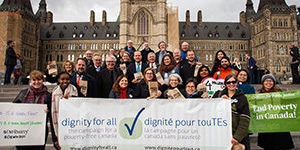In July 2017, Bill Morneau announced the Liberal government’s proposed tax reform, which seeks to close tax loopholes and ensure a more progressive tax system in which all Canadians pay their fair share.
One of the main loopholes targeted is known as “income sprinkling” by which income from a private business or corporation is distributed among family members, resulting in a lower tax burden. The proposed reform would prevent businesses from distributing income to family members who have no real involvement in the business. It does allow the practice to continue for those who share ownership or significant engagement. The government claims these proposals will result in “additional revenue of some $250 million per year once fully implemented.” This reclaimed revenue could mean significant investments in the common good such as strengthening the forthcoming Canadian Poverty Reduction Strategy, better honouring our environmental commitments, or supporting refugees coming to Canada.
Here at CPJ, we have consistently advocated for a fair taxation system that advances the common good in our society. And we are not alone. As outlined in Taxes for the Common Good: A Public Justice Primer on Taxation, 75 per cent of Canadians believe taxes are good because they pay for important social investments that can contribute to an improved quality of life. But not everyone is happy with these proposals, and they have created quite a stir among the Canadian public.
As in any policy debate, it is important that dissenting voices are not silenced, but are given the opportunity to have their concerns heard. And the government did invite submissions from the Canadian public, with doctors and small business owners among those most vocally opposed to the proposed reforms. To their credit, the federal government did make some changes in order to offer greater protection to small business owners across the country.
“Taxes are not simply about money or fees collected by governments. Taxes are equally about public programs and services, reducing poverty and the harmful effects of inequality, and protecting the environment. Taxes are about building the kind of Canada we want.”
—Taxes for the Common Good: A Public Justice Primer on Taxation
Aside from the policy itself, however, controversies regarding the ethical integrity of Finance Minister Bill Morneau have dominated government debates, undermining the credibility of the proposed reforms. If there is one thing that this experience has shown, it is that fairness and transparency are critical when dealing with tax reform rollouts in this country. The current government failed in that regard, and many Canadians are disappointed with their delivery of these important policy changes – and rightly so.
Nonetheless, the federal government (and we as citizens) should remain committed to a progressive taxation system. Morneau has assured Canadians that “the most impact will be felt by those business owners who are making $150,000 a year or more, or those who have money to tuck away after contributing the annual maximum to RRSPs and TFSAs.” This is important because a fair tax plan includes individuals who use private corporations in their tax strategy. Income earners in lower tax brackets should not bear the financial burden of income sprinkling or any other tax loopholes that are only accessible to the wealthy few. But it is critical that we not allow tax reforms to divide us as a nation. In fact, increasing income equality has demonstrable benefits to social cohesion.
Taxes are not a punishment. However, many critics of taxation frame it as such. Or as a violation of individual rights by the government. But we shouldn’t fall prey to a false sense of antagonism between the government and its tax-paying citizens. It is important that we not lose sight of the fact that a fair taxation system can contribute significantly to the common good, and by extension, to public justice.





i approve of this fair tax
i approve of this fair tax policy, especially eliminating tax sprinkling. I believe that professionals have opportunity with increased RRSP contributions etc to plan well for retirement and the future, without using this loophole allowing tax benefits to uninvolved family members.I am a retired professional myself.
Thank you for your comment,
Thank you for your comment, Audrey!